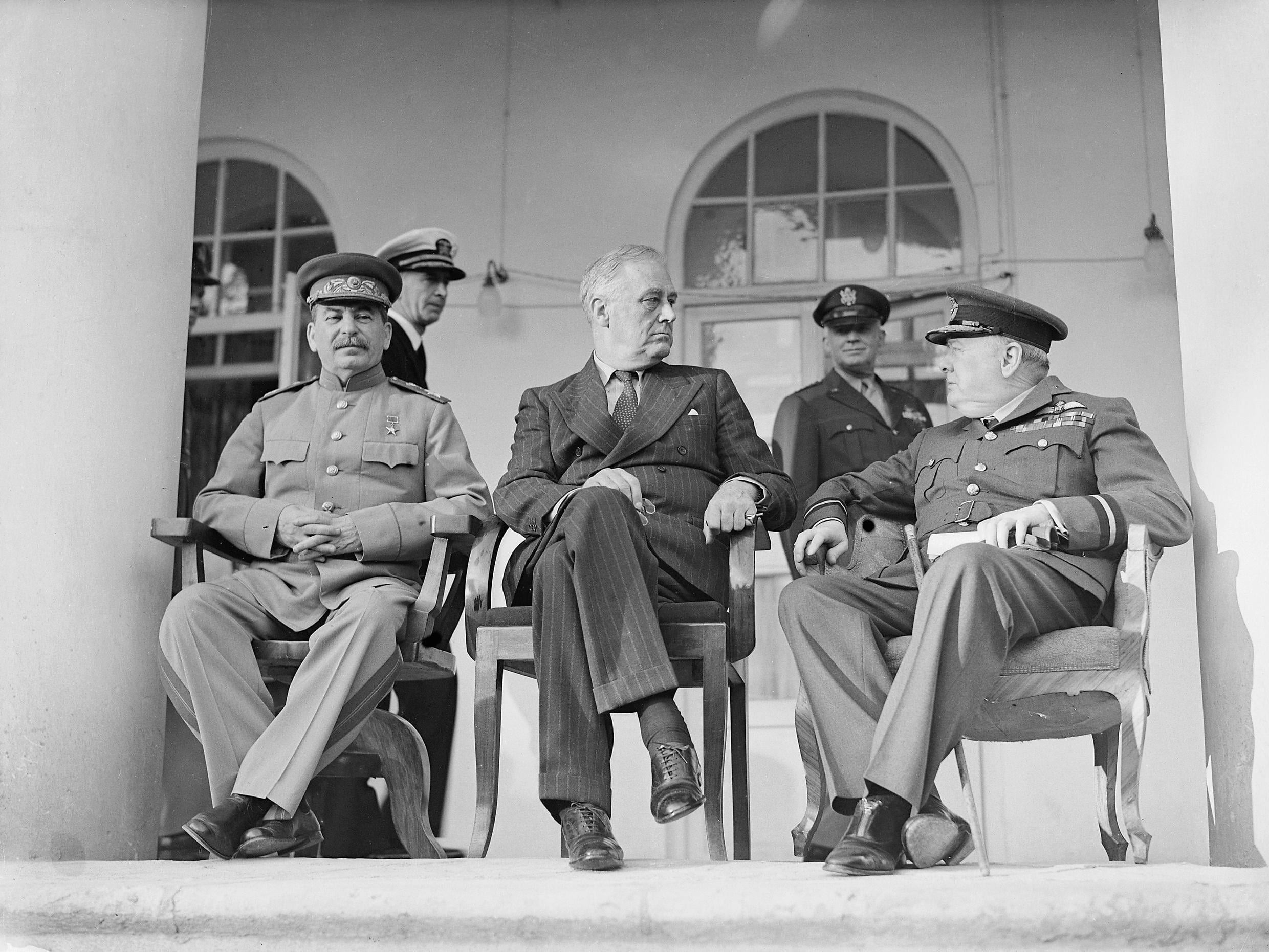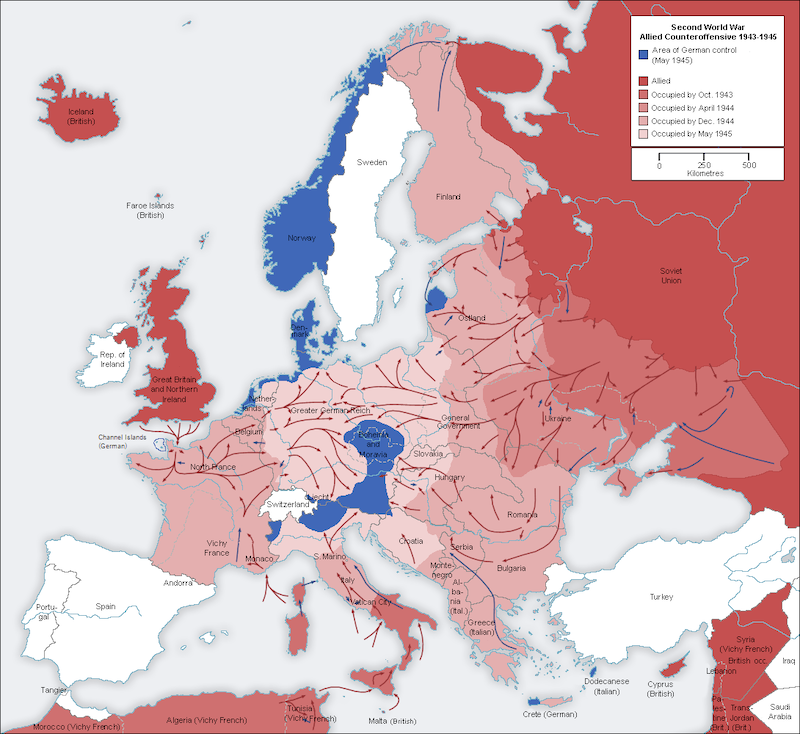
Any severe pupil of historical past will let you know that pinning down the exact origins of nice occasions is troublesome at greatest, however one can usually discover necessary moments that provide a glimpse into their long-term origins. The Tehran Convention, convened eighty years in the past on the top of WWII, is such a second. Code named Operation Eureka, the convention opened on November 28th, 1943 and introduced collectively the three Allied leaders, U.S. President Franklin D. Roosevelt, British Prime Minister Winston Churchill, and Soviet Normal Secretary (or as he’s referred to within the notes of the assembly – Marshall) Joseph Stalin of the united statesS.R. An in depth examination of the notes from this three-day convention offers us necessary insights into not simply plans for the struggle itself, however doable origins of the Chilly Warfare that adopted.
Planning for Victory
By the point the convention opened, the struggle had turned considerably, however not conclusively, within the Allies’ favor. The Germans had been overwhelmed in Africa, Fascism was collapsing in Italy, and the Russians had turned again Hitler’s ill-fated invasion and had been slowly however steadily transferring west. So, whereas one goal of the assembly was to debate plans for the conclusion of the struggle, notably the opening of a second entrance within the West, the standing of Europe after the struggle, significantly concerning Germany and Japanese Europe, was additionally necessary. Drawing on the notes taken throughout the numerous conferences and personal discussions held between November 28th and December 1st, we see the muse of a number of of the Chilly Warfare’s most crucial points.

Stalin dominated the dinner assembly of November 28th and alongside together with his animus in the direction of Germany, he clearly didn’t belief France, asserting that their ruling class was “rotten to the core” and now “actively serving to our enemies.” Each Churchill and FDR denied any intention to safe extra territory for his or her respective nations, and each supported Stalin with regard to France. FDR advised that anybody over 40 years outdated be eradicated from any future French authorities and that sure territories, like Dakkar and New Caledonia, be positioned underneath the trusteeship of the United Nations.
The dialog then turned to Germany and once more Marshall Stalin took the lead, though all three had been in favor of its dismemberment. How lengthy they anticipated that standing to final is open to hypothesis, but it surely’s not arduous to think about Stalin planning for a prolonged Soviet occupation of some a part of it. Within the technique of discussing future borders and the Soviet want for a warm-water port, two different future Chilly Warfare points got here up. First, Poland entered the dialogue. Its jap boundaries had been to vary to permit for a Soviet port on the Baltic, with recompense supplied by extending (with Russian help) Poland’s western boundaries to the Oder River, which might restore German held territory to Poland. There was additionally a quick dialogue of the standing of the Baltic States, maybe on account of a translation. FDR advised some type of worldwide state close to the Kiel Canal to make sure free passage for all and the Soviet translator gave Marshall Stalin the impression the President was speaking in regards to the Baltic States themselves. Stalin rapidly insisted that they’d already voted to affix the united statesS.R. by “an expression of the need of the folks” so so far as he was involved, the topic was closed.
Personalities, D-Day, and the Way forward for Poland
After Roosevelt retired to his rooms within the Soviet Embassy (exhibiting a belief in Stalin’s generosity few may need shared at the moment) Churchill and Stalin continued the dialogue. After making an attempt to attract a distinction between the German leaders and the German folks, firmly rejected by Stalin, Churchill returned to the subject of Poland. Reminding the Marshall that Nice Britain had entered the struggle on account of its commitments to Poland, the Prime Minister agreed that the united statesS.R. was entitled to safe its western borders however insisted {that a} robust and impartial Poland was a “crucial instrument within the European orchestra.” He additional proposed that the three leaders craft some elementary understanding of Poland’s future standing that he might take to the Polish government-in-exile in London, however Marshall Stalin was noncommittal. Did he already see the occupation of Poland as a long-term Soviet purpose?
Maybe impressed by Churchill’s robust place concerning Poland, Stalin misplaced no alternative to take pictures at him on the subsequent dinner assembly on November 29th. He began off suggesting that the Prime Minister may harbor some “secret affection” for the German folks and may be on the lookout for a “delicate peace.” The banter (characterised as each “pleasant” and “vigorous”) continued as Churchill objected strenuously to Stalin’s suggestion that as much as 100,000 members of the German Command Employees needed to be executed to insure her continued weak point post-war. It’s doubtless that Stalin’s feedback had been actually aimed pushing Britain in the direction of his proposed second entrance in Western Europe as Churchill was nonetheless arguing for his plan to hit Germany from the “delicate underbelly” of Italy and the Balkans. However since Churchill and FDR had beforehand mentioned the invasion they reassured the Soviet chief in a plenary session on November 30th that Operation Overlord was scheduled for Could of 1944.
FDR and Stalin – Too Trusting?
On the identical time, it’s doable that Stalin’s actions and phrases had one other goal. He might effectively have been satisfied that he might deal with FDR extra simply than Churchill and hoped to drive a wedge between the 2. His conviction might have been impressed by Roosevelt’s personal estimation of his relationship with “Uncle Joe.” In a letter to Churchill, FDR stated he might “deal with Stalin personally higher than both your International Workplace or my State Division. Stalin hates the heart of all of your prime folks. He thinks he likes me higher, and I hope he’ll proceed to take action.” He even went as far as to request a non-public assembly with Stalin, linking his considerations about Poland together with his electoral possibilities in 1944. He was involved that any public suggestion to vary Poland’s borders to profit the united statesS.R. would offend massive parts of his constituency within the U.S. He additionally spoke in favor of referenda for the Baltic states, however reassured the Marshall that he was “assured the folks would vote to affix the Soviet Union.” It’s troublesome to not see FDR’s phrases as encouragement for Stalin’s expansionist plans.
Within the political assembly of December 1st, the dialogue turned once more to the standing of Poland and the post-war dismantling of Germany. Churchill resumed his argument that Britain entered the struggle due to Hitler’s invasion of Poland, although he additionally assured Marshall Stalin that the united statesS.R. was entitled to safe western borders. Stalin asserted his want to have pleasant relations with Poland however drew a distinction between Poland itself and the Polish government-in-exile in London. He accused them of “slanderous propaganda” and the killing of partisans however stated he might negotiate with them in the event that they modified their conduct. At this level, Churchill advised taking a suggestion to the government-in-exile, with out telling them it got here from the Russians, and informed Stalin that in the event that they refused the supply, “Nice Britain could be by way of with them.” They mentioned a number of variations on a selected border however made no agency dedication to 1 plan. So far as Germany was involved, a number of plans had been advised involving bigger and smaller collections of the German states. Everybody appeared to agree that Germany needed to be damaged up however once more no definitive answer was reached.
Alternatives Seized and Missed?
On the finish of three days, a number of necessary selections had been made, however some had been additionally prevented, serving to set the stage for 50 years of Chilly Warfare between the East and West. Operation Overlord was in movement, relieving a few of Stalin’s fears of dealing with the Germans with out extra Allied assist. Plans had been additionally laid for Germany’s future, none of them agency and all of them giving appreciable energy to the Soviet Union, and not using a particular dedication from Stalin to the eventual freedom of that nation. The Baltic states had been delivered as much as Stalin on a silver platter and Poland received little if any safety within the convention, regardless of all of Churchill’s efforts. Nobody appeared to see the potential of the united statesS.R. taking all that territory and retaining it. A few of this failure should be laid at FDR’s toes. Did his perception in his means to handle the Soviet dictator, mixed together with his worries in regards to the subsequent election, embolden Stalin to take and maintain greater than he may need? Three highly effective and head-strong leaders gathered in Tehran for 3 days in 1943. How they every navigated these conferences goes a protracted approach to explaining not simply how they got here to their closing public statements about what occurred in Tehran, however how the early seeds of the decades-long Chilly Warfare had been planted.

Rusty Eder is a Instructor Accomplice with Educating American Historical past and the Historical past Chair, Academy Historian and Dean of College at West Nottingham Academy.